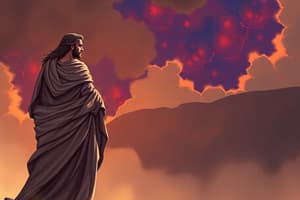Podcast
Questions and Answers
What does Antigone primarily symbolize in the context of her character analysis?
What does Antigone primarily symbolize in the context of her character analysis?
- Compromise between laws
- Fear of destiny
- Resistance against tyranny (correct)
- Obedience to the state
Which theme illustrates the characters' struggle between divine will and human regulations?
Which theme illustrates the characters' struggle between divine will and human regulations?
- Inevitability
- Tragic Hero
- Sisterly Love
- Divine vs. Human Law (correct)
How does Creon's tragic flaw manifest in the narrative?
How does Creon's tragic flaw manifest in the narrative?
- His excessive compassion harms his decisions
- His manipulative nature brings conflict
- His rigid adherence to law causes tragedy (correct)
- His indecisiveness leads to failure
What moral conflict does Antigone face within the overarching narrative?
What moral conflict does Antigone face within the overarching narrative?
What aspect of Greek tragedy is exemplified by the emotional release experienced by the audience?
What aspect of Greek tragedy is exemplified by the emotional release experienced by the audience?
Which character reflects the beginning of change in traditional gender roles within the play?
Which character reflects the beginning of change in traditional gender roles within the play?
What does the concept of hamartia refer to in this context?
What does the concept of hamartia refer to in this context?
How does Ismene's character evolve throughout the story?
How does Ismene's character evolve throughout the story?
What is the primary setting of Antigone?
What is the primary setting of Antigone?
Which character serves as a representation of obedience in the play?
Which character serves as a representation of obedience in the play?
What does Antigone's decision to bury Polynices ultimately represent?
What does Antigone's decision to bury Polynices ultimately represent?
How does the theme of feminism manifest in Antigone's character?
How does the theme of feminism manifest in Antigone's character?
What lesson does Creon's downfall illustrate in the narrative?
What lesson does Creon's downfall illustrate in the narrative?
What does the burial of Polynices symbolize within the play?
What does the burial of Polynices symbolize within the play?
Which literary device is used to hint at the dire consequences of Creon's decisions?
Which literary device is used to hint at the dire consequences of Creon's decisions?
In what significant way does Antigone embody the characteristics of a tragic hero?
In what significant way does Antigone embody the characteristics of a tragic hero?
What does Antigone's tomb symbolize in the context of her actions?
What does Antigone's tomb symbolize in the context of her actions?
What moral dilemma does the play primarily focus on?
What moral dilemma does the play primarily focus on?
Flashcards are hidden until you start studying
Study Notes
Themes of Fate
- Inevitability: Fate is portrayed as a predetermined force, controlling the characters' lives.
- Tragic Hero: Antigone's actions lead to her doom, reflecting the idea that individuals cannot escape their destiny.
- Divine vs. Human Law: Characters struggle between fulfilling their fates according to divine will versus human regulations.
Character Analysis
-
Antigone:
- Defiant and principled, willing to die for family loyalty and divine law.
- Symbolizes resistance against tyranny and moral integrity.
-
Creon:
- Represents state authority and the importance of law and order.
- His rigidness leads to personal tragedy, showcasing the conflict between power and morality.
-
Ismene:
- Initially passive, representing the struggle of women in society.
- Evolved character who eventually supports Antigone but is less assertive.
-
Haemon:
- Son of Creon and engaged to Antigone; embodies youthful passion and the desire for compromise.
- His internal conflict between loyalty to father and love for Antigone highlights moral dilemmas.
Moral Conflict
- Antigone vs. Creon: Central conflict of loyalty to family versus duty to the state.
- Personal vs. Societal Morality: Characters grapple with what is just and the consequences of their choices.
- Consequences of Actions: Each character’s moral decisions lead to tragic outcomes, questioning the ethics of their beliefs.
Family Dynamics
- Sisterly Love: Antigone's commitment to burying her brother Polynices showcases deep familial loyalty.
- Patriarchy vs. Female Agency: Antigone challenges traditional gender roles, emphasizing the power of women in familial contexts.
- Tragic Legacy: The family is cursed, highlighting themes of inherited tragedy and the impact of past actions on current generations.
Greek Tragedy Elements
- Hamartia: Key tragic flaw, such as Creon’s hubris or Antigone’s stubbornness, leading to downfall.
- Catharsis: Evokes pity and fear, allowing audience to experience emotional release through the characters’ struggles.
- Chorus: Provides commentary, reflects on moral messages, and enhances the emotional impact of the narrative.
- Irony: Situational irony where characters’ intentions lead to opposite outcomes, emphasizing the unpredictability of fate.
Themes of Fate
- Fate is a predetermined force, shaping characters' lives.
- Characters struggle with the tension between divine law and human regulations.
- Antigone's tragic downfall exemplifies the idea that individuals cannot escape their destiny.
Character Analysis
- Antigone embodies defiance, loyalty to family, and moral integrity.
- Creon represents state authority and the importance of law and order but his rigidness ultimately leads to his own tragedy.
- Ismene initially symbolizes passivity but evolves to support Antigone, highlighting the challenges women face in society.
- Haemon represents youthful passion, the desire for compromise, and internal conflict between loyalty to his father and love for Antigone.
Moral Conflict
- The core conflict lies between Antigone's loyalty to family and Creon's duty to the state.
- Characters grapple with personal and societal morality, highlighting the consequences of their choices.
- Each character’s actions lead to tragic outcomes, raising questions about the ethics of their beliefs.
Family Dynamics
- Antigone's commitment to burying her brother Polynices underscores the profound importance of familial loyalty.
- Antigone challenges traditional gender roles, showcasing female agency within family contexts.
- The play explores themes of inherited tragedy and the lasting impact of past actions on subsequent generations.
Greek Tragedy Elements
- The characters possess tragic flaws, like Creon's hubris and Antigone's stubbornness, leading to their downfall.
- The play evokes emotions like pity and fear, allowing the audience to experience catharsis through the characters' struggles.
- The Chorus offers commentary, reflects on moral messages, and enhances the emotional impact of the narrative.
- Situational irony underscores the unpredictability of fate, as characters' intentions often lead to unintended consequences.
Overview of Antigone
- Author: Sophocles, an ancient Greek playwright
- Genre: Tragedy
- Key Themes:
- Conflict between individual conscience and state law
- Fate vs. free will
- The role of women in society
- Loyalty to family vs. duty to the state
Plot Summary
- Setting: Thebes, following a civil war.
- Main Characters:
- Antigone: Protagonist, sister of Polynices and Eteocles.
- Creon: King of Thebes, Antigone's uncle.
- Ismene: Antigone's sister, represents obedience.
- Polynices: Antigone’s brother, denied a proper burial.
- Haemon: Creon's son, engaged to Antigone.
- Tiresias: Blind prophet.
- Conflict: Antigone defies Creon’s edict prohibiting the burial of her brother Polynices. She believes in the divine law over human law.
- Climax: Antigone is caught burying Polynices and is sentenced to death. The tension between Antigone and Creon reaches a breaking point.
- Resolution: Haemon attempts to save Antigone, leading to tragic consequences. Antigone ultimately takes her own life. Creon, realizing his mistakes, is left to confront his ruined family and kingdom.
Major Themes Explained
- Moral Conflict: Antigone’s actions raise questions about morality and justice.
- Feminism: Antigone challenges gender norms by asserting her right to choose her path.
- Consequences of Pride: Creon’s hubris leads to his downfall, illustrating the dangers of excessive pride.
Symbolism
- Burial: Represents respect for the dead and the laws of the gods.
- Thebes: Symbolizes chaos and the struggle between opposing forces.
- Antigone’s tomb: The ultimate sacrifice for one’s beliefs and civil disobedience.
Literary Devices
- Tragic Hero: Antigone is considered a tragic hero due to her noble qualities and tragic downfall.
- Foreshadowing: Early warnings from Tiresias hint at the dire consequences of rigid adherence to laws.
Conclusion
- Antigone serves as a timeless exploration of human ethics, the law, and individual rights. Its complex characters and themes continue to resonate in contemporary discussions of morality and justice.
Studying That Suits You
Use AI to generate personalized quizzes and flashcards to suit your learning preferences.




